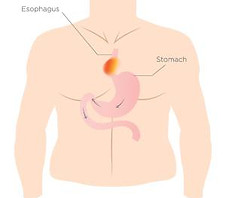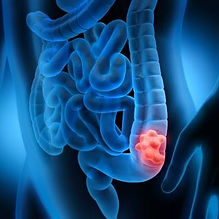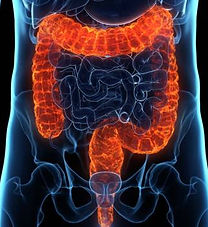Prior to moving to Israel in 2020, Professor Rubin was rated a “Best Doctor” by Castle Connolly and by New York Superdoctors for over 20 years. After graduating Yale University School of Medicine, Prof Rubin completed his internal medicine training at New York Presbyterian Cornell Medical Center and his fellowship training at New York Presbyterian Hospital Columbia University Medical Center where he remained on the faculty for many years. He was subsequently appointed Division Chief and Director of Fellowship Training at New York Presbyterian Queens Weill Cornell. His longstanding approach to patient care is to focus on each person as an individual, obtaining a careful history and then implementing an appropriate diagnostic and treatment plan. Professor Rubin is an expert endoscopist with extensive experience in both basic and advanced endoscopy, colonoscopy and Double Balloon Enteroscopy.
Disorders of the Upper GI Tract
Among the upper digestive organs are the esophagus, stomach, triserion, gallbladder, and pancreas.
Symptoms associated with the upper digestive system
In cases of upper digestive problems, people often report one or more of the following:
belching
Upper abdominal pain
Heartburn
Nausea
Swallowing difficulties
Vomiting
Bloated stomach
Possible Diagnoses

Hiatus Hernia
Hiatus Hernia a loosening of the diaphragm resulting in the stomach sliding up into the chest is often associated with acid reflux and can if untreated can lead to serious disorders of the esophagus.

Esophagitis
Esophagitis - inflammation of the lining of the esophagus as a result of acid reflux.

Peptic ulcer disease
Peptic ulcer disease - gastric and duodenal ulcers that can occur in the setting of an infection with Helicobacter pylori or the use of aspirin or Non steroids anti inflammatory drugs.

Gastroenteritis
Inflammation of the stomach lining caused by Helicobacter bacteria or by drugs, resulting in abdominal pain, nausea, and swelling.

Gallstones
Gallstones- Gallbladder are very common and affects a large number of people. It often presents with right sided or upper mid abdominal pain after meals.
Disorders of the lower GI Tract
Lower GI Tract disorders include disorders of the small intestine, large intestine and rectum
Symptoms associated with the lower digestive system
Symptoms of lower GI Tract disorders include mid or lower abdominal pain, change in bowel habits, diarrhea, constipation rectal bleeding, bloating, gas and rectal pain.
Pain in the lower abdomen
Bowel habits
Diarrhea
Constipation
Gas
Rectal blood
Occult blood in stool
Irritable bowel syndrome
Anorectal discomfort
Possible Diagnoses

Irritable bowel syndrome
This syndrome causes abdominal pain, bloating, diarrhea, gas, and constipation without affecting the digestive system in any way.

Hemorrhoids
Veins in the anal canal, causing itching, swelling, and discomfort, and sometimes even bleeding.

Fissure
Common, crack or tiny cut in the anus, causing pain and bleeding.

Tumors of the digestive tract (polyps)
Colon polyps. There is a 1/3 chance of developing a colon polyp, a small or large growth on the inner surface of the colon. These polyps are typically benign and are easily removed, but if they are not removed they have the potential of turning into cancer.

A colonic cancer
Colon Cancer remains one of the most common cancers. They can grow inside the colon without symptoms but at later stages they can cause rectal bleeding or a change bowel habits. With routine colonoscopy the risk of developing colon cancer is markedly reduced.

Diverticulosis
Diverticulosis and Diverticulitis are very common abnormalities of the colon. They are small defects in the lining of the colon that are often symptomatic but on occasion can cause infection (diverticulitis) and bleeding.
Chronic Diseases

Colitis
As a result of inflammation in the colon, colitis causes acute bloody diarrhea, weight loss, and abdominal pain.

Celiac
Celiac Disease also known as gluten enteropathy is an inflammation of the small intestine due to the ingestion of grains that contain gluten. Symptoms can be mild or severe and include diarrhea, bloating, weight loss, vitamin deficiencies, fatigue and anemia.

Crohn’s
Crohn’s Disease and Ulcerative Colitis are very common especially in Israel. They can present at a young or older age. Inflammation and ulceration develops in either the small or large intestine and causes pain, rectal bleeding, weight loss and anemia.
Diagnostics of Diseases
Assessing symptoms, performing physical examinations, performing laboratory tests, obtaining imaging, and selecting an appropriate procedure to evaluate the digestive system.
Colonoscopy
a scope is passed through the rectum into the colon under sedation and after a preparation to diagnose and treat lower GI tract disorders

Gastroscopy
a scope is passed under sedation into the upper GI tract to diagnose and treat upper GI tract disorders

Enteroscopy
Double Balloon Enteroscopy is a specialized scope for evaluating and treating disorders of the small intestine. Expertise in this area is rare.
The diagnostic process
Prof. Rubin follows a thorough and in-depth diagnostic process, beginning with a patient's description of their symptoms and review of their medical history, followed by a comprehensive physical examination and forming a treatment plan.
Depending on the medical condition, additional tests may be ordered, such as ultrasound and CT scans, referrals to specific blood tests, and appointments for endoscopic examinations such as colonoscopy, gastroscopy, and other tests.
Prof. Robin has extensive experience performing endoscopic examinations, including complex operations such as double balloon endoscopy and deep endoscopy.
As soon as the diagnostic phase is completed, Prof. Rubin will plan and carry out the appropriate treatment. Following the treatment, Prof. Rubin will continue to monitor the patient until no further monitoring is required.
Routine Tests
Testing routinely saves lives!
Each year, thousands of people around the world are saved from cancerous diseases by early detection and prevention. Regular tests can mean the difference between brief discomfort and a long and serious illness, so it is imperative to follow the Ministry of Health's recommendations.
Colonoscopy

After the age of 50, a colonoscopy is recommended every 5 to 10 years. Early diagnosis can save lives! Colonoscopy is an examination and preventive treatment of the lower digestive system (large intestine).
One out of three people who undergo a colonoscopy have polyps that need to be removed and examined by Prof. Rubin (polypectomy). His extensive experience includes identifying and removing suspicious polyps accurately. Professor Rubin continues to accompany patients, analyze laboratory results, and, if necessary, prescribe further treatment.
Career Path
Senior physician, department head, consultant to start-up companies with 28 years of experience.
Senior doctor Shaare Zedek Hospital, Assuta and Maccabi HMO
Professor in the Department of Medicine - Columbia University
Professor in the Department of Medicine - Cornell University
Senior Physician New York-Presbyterian/Weill Cornell Medical Center
Head of the New York-Presbyterian Queens Department
Fellow, American Gastroenterology Association (AGA)
Fellow, American College of Gastroenterology (ACG).



Academic Training
Professor Robin has studied and trained at three of the world's most prestigious institutions. Listed in the Top 10 of the academic institutions in the USA, the three universities are considered prestigious, desirable, and part of the exclusive Ivy League.
Yale University School of Medicine (Medical School)
Internal medicine residency at Cornell University Hospital in New York
Fellowship in gastroenterology at Columbia University Presbyterian Hospital



.png)
Here are more ways to see Professor Robin
Patients also can be seen by Professor Rubin through Sha'are Zedek (sharap) and Maccabi
Maccabi
Call the appointment center or use the app to schedule an appointment with Maccabi HMO
Sha'are Zedek (sharap)
